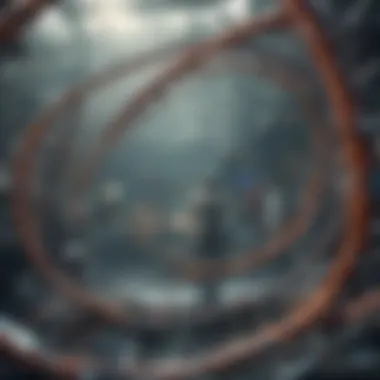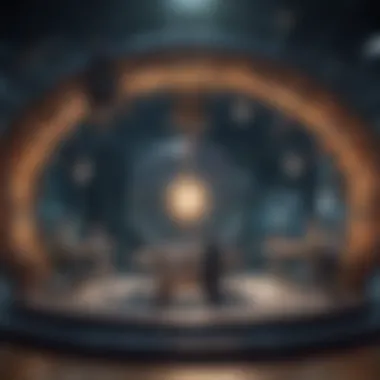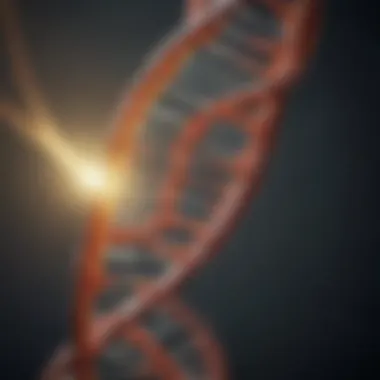Exploring The Code Breaker: Innovation and Ethics


Intro
In an era where the whispers of science seem almost like the script of a thrilling screenplay, The Code Breaker invites readers into the intricate dance of genetics and innovation. This book, through its vivid storytelling, illuminates the landscape of gene editing, offering compelling narratives that are as much about the people behind these breakthroughs as the science itself. As we navigate the waters of CRISPR technology, the book sheds light on the potential ethical quagmires that come with powerful capabilities in genetic manipulation.
Book Categories
Non-Fiction and Science
Though the narrative thread carries a strong story-telling aspect, The Code Breaker belongs firmly in the realm of non-fiction. Readers get to grapple with actual events and personages in the field of molecular biology, all while digesting the impact of their work on everyday lives.
Self-Help and Personal Development
In a surprising twist, this book can also fit into the category of personal development. As readers reflect on the ethical lessons and the human aspect of science, the book encourages a deeper introspection into one's values in the face of innovation, nudging the reader to think about their role in technology and ethics.
Key Insights and Takeaways
The Code Breaker is more than just a narrative on genetics; it's a lens through which we can appreciate the delicate balance of scientific advancement and ethical responsibility. Here are some key insights to ponder:
- Innovation without Borders: The book illustrates how science transcends geographical and political lines, showcasing collaboration at its finest.
- The Ethical Dilemma: With great power, as they say, comes great responsibility. The narratives explore various ethical dimensions related to gene editing.
- Human Connection: It spotlights personal stories, revealing that the cold world of science is, in fact, governed by human emotions, struggles, and triumphs.
"Science is not only a disciple of reason but, also, one of romance and passion."
– Stephen Hawking
How to Apply the Lessons
Understanding the themes presented in The Code Breaker leads to practical applications in both professional and personal settings. Here are some ways to weave these lessons into life:
- Stay Informed: Engage with developments in genetics. Subscribe to reliable journals or platforms that offer updates on CRISPR technology.
- Ethical Engagement: Discuss and reflect on the ethical implications of technologies with peers, family, or at community forums.
- Personal Reflection: Think critically about how innovations can affect your own choices and responsibilities.
- Foster Collaboration: Just as scientists across the globe collaborate, incorporate shared learning in your own endeavors, be it work or personal growth.
Through these insights and action points, readers can better understand the relationship between innovation and ethics and how they can approach both with a mindful attitude.
Prolusion to The Code Breaker
The exploration of genetic science is not just a dry topic confined to laboratories and academic papers; it permeates our lives, shaping how we understand health, identity, and even culture. In this light, The Code Breaker emerges as a significant contribution to that discourse. The book serves as a beacon—illuminating the complex web of gene editing through the lens of personal stories and groundbreaking scientific research. Its relevance resonates deeply in an age where advancements in CRISPR technology hold the promise of startling medical breakthroughs as well as ethical quandaries.
The importance of this work lies not only in its scientific underpinnings but also in its ability to connect these themes to the broader human narrative. Readers are invited into the lives of scientists who toil in the trenches of research, as they grapple with the moral implications of their discoveries. The book challenges us to consider, "What does it mean to be human in a world where we can edit the code of life?" It presents an accessible entry point for those who might be intimidated by genetics, while still offering rich content for seasoned readers. Therefore, this article’s exploration into The Code Breaker is essential for anyone keen on understanding the intersections of science, ethics, and personal growth.
Overview of the Book's Premise
At its core, The Code Breaker navigates the intricacies of CRISPR technology, a revolutionary method that allows for precise alterations in DNA. The narrative unfolds through the stories of individual scientists and their triumphs as well as failures. It looks at how insects, plants, and even humans are tied together in the grand tapestry of genetic research.
The book does not shy away from the sticky issues surrounding gene editing. It ponders significant questions: How do we balance innovation with caution? Should we have the power to create genetically modified humans? By framing these discussions within riveting personal tales, the author creates an engaging juxtaposition of discovery and morality.
Author’s Background and Credentials
The author's credibility in addressing these pressing issues stems from her extensive background in science journalism. With credentials that include writing for high-profile publications and a deep understanding of genetic engineering, she brings a well-rounded perspective to the text. This background not only validates her insights but also engages a diverse audience.
Moreover, the author’s knack for translating complex scientific concepts into relatable narratives ensures that readers from all walks of life can grasp the nuances behind gene editing technologies. Her approach helps demystify the science while retaining the intellectual rigor needed to appreciate the profound implications of such innovations. Therefore, the dual power of storytelling combined with expert knowledge draws readers into a realm where science and humanity intersect.
Key Themes Explored


Exploring the core themes within 'The Code Breaker' reveals an intricate web of knowledge that is not just about biology, but also about the very fabric of human existence. These themes delve into the double helix of innovation and ethics that inherently questions the bounds of human capability. Each theme discussed serves to illuminate how the capabilities of gene editing intersect with societal norms, personal stories, and broader implications for our species.
The Power of CRISPR Technology
The CRISPR technology emerges as a groundbreaking innovation, revolutionizing the field of genetics. This sophisticated tool allows scientists to make precise alterations to the DNA of living organisms, paving the way for remarkable advancements. The efficacy of CRISPR is akin to a scalpel in the hands of a skilled surgeon; it can either mend or modify the very essence of life itself.
As a result, the potential applications of CRISPR technology appear both vast and varied:
- Treating genetic disorders such as sickle cell anemia
- Enhancing agricultural productivity by developing crops resistant to pests
- Potentially combating infectious diseases like HIV
One cannot underscore the role this technology plays in the ascendance of personalized medicine, where treatments can be tailored to the individual's genetic makeup. From the medical community to farmers, the ripples of CRISPR's impact can be felt across all sectors.
Ethical Considerations in Gene Editing
Yet, with great power comes great responsibility. The ethical quandaries surrounding gene editing are as pronounced as the technology's promise. Many scholars and ethicists have started to question which boundaries should be respected in the relentless pursuit of innovation. For example, should gene editing be employed for enhancement purposes, or should it be limited to therapeutic measures?
The intersection of ethics and genetics raises compelling discussions about:
- Consent: How do we ensure that the rights of future generations are considered?
- Accessibility: Will these advancements be available to all, or just to a privileged few?
- Eugenics: Are we treading dangerous waters reminiscent of past ideologies?
"Every innovation has its price; navigating the ethical maze is just as crucial as the scientific endeavor itself.”
This deliberation demands a multi-faceted discourse that involves scientists, ethicists, and the public alike, ensuring a balanced approach that prioritizes ethical standards while pursuing groundbreaking research.
Personal Narratives of Scientists
What really cuts to the heart of 'The Code Breaker' are the personal stories of scientists passionate about their craft. These narratives humanize the sterile, clinical nature of scientific accomplishments. This theme aids readers in recognizing that behind groundbreaking discoveries are individuals fueled by curiosity, determination, and sometimes, personal sacrifice.
The book brings forward stories of several notable figures such as:
- Jennifer Doudna, who faced immense challenges during her research, showcasing persistence in the face of obstacles.
- Emmanuelle Charpentier, whose collaboration with Doudna highlights the importance of teamwork in scientific discovery.
Their emotional journeys reveal the trials, tribulations, and triumphs that typically go unnoticed. By sharing these experiences, 'The Code Breaker' invites readers to connect with the science on a personal level, rooting the intricate facts in relatable human experience.
Scientific Innovations Highlighted
In our exploration of The Code Breaker, the section on scientific innovations takes center stage, providing insight into how pioneering research is reshaping the landscape of genetics and biotechnology. This narrative captures the essence of breakthroughs that not only advance scientific knowledge but also highlight the profound implications these discoveries hold for the future of humanity. Understanding these innovations is essential, as it lays the groundwork for comprehending the broader conversations surrounding CRISPR technology and its potential applications.
Breakthroughs in Genetic Research
Innovation in genetic research has witnessed a remarkable trajectory in the past couple of decades. The advent of CRISPR technology has changed the game. It allows for precise editing of DNA, a technique often likened to a "molecular scissors" that can snip out undesirable genetic material and replace it with new sequences. This is no small feat; it offers a potential cure for genetic disorders that have plagued humanity for generations.
In The Code Breaker, we encounter vivid examples of these breakthroughs. The narrative tells us about scientists who have tackled serious diseases such as sickle cell anemia and cystic fibrosis. Their relentless pursuit for answers turned into tangible results, achieving a level of success that once seemed merely aspirational.
The author delves into each breakthrough in a way that invites readers to ponder the intricacies involved. Imagine the impact on families that may no longer face the burden of hereditary diseases. This is not just scientific advancement; it is a compassionate leap toward reducing human suffering.
Real-Life Applications of Gene Editing
When exploring the real-life applications of gene editing detailed in The Code Breaker, the conversation gets both exciting and complex. The contexts where these innovations find practical applications vary widely—from agriculture to medicine, the scope is as vast as it is crucial.
For example, gene editing has made waves in crop production. By enhancing the resilience of crops to pests and diseases, the agricultural sector can significantly reduce the use of harmful pesticides. This not only benefits the environment but also promotes food security for an ever-growing global population.


In medicine, the applications extend into realms we once thought unimaginable. Treatment protocols are being developed for conditions that previously had no cure. As we see in the book, researchers are working on tailored therapies that utilize gene editing to ensure that they target the unique characteristics of a patient's illness. This personalized approach could revolutionize the healthcare industry.
“The future of healthcare lies in addressing the genetic blueprints of individual patients,” a prominent figure in the book asserts, emphasizing the transformative potential of gene editing.
In summary, the section on scientific innovations in The Code Breaker highlights how breakthroughs and real-life applications of gene editing are set to redefine our understanding of genetics and biotechnology. As we learn about these pioneering advancements, we are reminded of the delicate balance required when wielding such power, beckoning us to ponder not just the promise but the ethical frameworks guiding their use.
Impact on Personal Development
The section on the impact on personal development within the context of 'The Code Breaker' shines a spotlight on how the groundbreaking themes of resilience and innovation find their way into our lives. The book encourages readers to see the importance of understanding scientific advancements not only as academic knowledge but as a framework for personal growth and adaptability.
Lessons in Resilience and Innovation
In navigating the complex realm of gene editing, the stories within 'The Code Breaker' reveal valuable lessons in resilience. Scientists featured in the book often faced formidable obstacles, whether confronting ethical dilemmas or dealing with unexpected results in their experiments. Their journeys highlight a common thread: the capacity to bounce back from failure often leads to significant breakthroughs.
For example, Jennifer Doudna's early work in developing CRISPR encountered skepticism and setbacks. Yet, her perseverance not only contributed to a revolutionary technology but also serves as a beacon of what relentless pursuit can achieve in the face of adversity. It illustrates a crucial aspect—failure is not the end, but a stepping stone towards innovation.
These accounts push readers to reflect on their lives, embracing challenges not as discouragements but as opportunities for growth. Here are some key takeaways:
- Embrace Change: Like gene editing, personal growth requires us to adapt to new circumstances.
- Persistence Pays Off: Just as scientists often have to modify their approaches, individuals must remain committed to their goals.
- Collaboration is Key: The importance of teamwork in scientific progress highlights the value of seeking support from others in personal endeavors.
Influence on Future Generations
Looking beyond individual growth, the implications of the narratives in 'The Code Breaker' extend to future generations. The advancements in gene editing, particularly CRISPR technology, pose questions about our ethical responsibilities. With great power comes even greater challenges, and how today's readers perceive these challenges will shape the future.
The book inspires a vision where the next generation embraces science not just for discovery's sake but as a means of improving humanity. Children and young adults, inspired by the personal stories of scientists, may pursue careers in science, technology, engineering, and mathematics (STEM) fields with a fresh perspective.
Here are a few ways the book's themes can kindle interest in future generations:
- STEM Engagement: Encourages schools to incorporate discussions on bioethics and innovations in their curriculum, fostering a new wave of thinkers and doers.
- Critical Thinking: Instilling a sense of inquiry and ethical consideration in young minds as they witness the intersection of science and personal narrative.
- Mentorship: Readers may feel a renewed sense of duty to guide younger peers, emphasizing the role of knowledge sharing in shaping future leaders.
"Knowledge is power, but sharing it empowers others."
In summary, 'The Code Breaker' not only delineates a path for individual resilience and innovation but also sets the stage for a brighter, more informed future. By understanding the stories encapsulated within its pages, we forge connections that transcend generations, laying grounding blocks for a society that values scientific integrity and moral responsibility.
Comparative Analysis
A thorough comparative analysis serves as a cornerstone in understanding the nuances of gene editing, especially in the context of The Code Breaker. This section emphasizes the merits of juxtaposing various views on gene editing technologies—most notably CRISPR—highlighting the rich tapestry of insights that emerge when contrasting ideologies are meticulously evaluated. Such an analysis not only illuminates distinct scientific advancements but also underscores the ethical dilemmas that accompany them. By engaging with diverse perspectives, readers can better grasp the multifaceted discussions around genetic modification and its implications.
Contrasting Perspectives on Gene Editing
Gene editing is a topic that often occupies a heavy seat at the table of scientific discourse, pulling in various opinions from experts, ethicists, and the general public. In The Code Breaker, contrasting perspectives are given a platform, showcasing a spectrum of beliefs that range from enthusiastic endorsements advocating for its potential to cure diseases, to cautionary stances warning against unintended consequences. For instance:
- Supporters posit that gene editing can eliminate genetic disorders, enhance agricultural productivity, and even contribute to fighting climate change by developing more resilient crops.
- On the other hand, critics express concern about the long-term effects of tampering with nature. They argue that the creation of “designer babies” could lead to a widening social divide, exacerbating issues of inequality.
As readers reflect on these differing viewpoints, they are urged to consider the underlying ethical frameworks that shape them. The debates capture not just scientific concerns but also cultural, moral, and philosophical discussions, elevating the dialogue around gene editing from mere technicalities to profound societal implications.
The Book in Relation to Other Works
When we lay The Code Breaker alongside other works within the scientific literature landscape, it undoubtedly stands out. Authors like Walter Isaacson often weave narratives where science is not merely a backdrop, but a rich thread that binds human experience. Comparative literature offers a broader view that helps situate The Code Breaker within a lineage of scientific inquiry literature.


For example, books like Genentech: The Beginnings of Biotech by Sally Smith Hughes share a pioneering spirit in biotech narratives but focus on different aspects like corporate evolution rather than individual scientist journeys. Conversely, The Gene: An Intimate History by Siddhartha Mukherjee, like The Code Breaker, dives deep into the personal stories interwoven with scientific advancements, focusing heavily on the historical and cultural implications of genetic research.
In contrast to these titles, The Code Breaker leans heavily into narratives of scientific innovation at a watershed moment in genetics, emphasizing CRISPR’s transformative potential while maintaining a careful eye on ethical considerations. This comparative exploration not only enriches the reading experience but also serves as an intellectual foundation, steering readers toward deeper inquiries into the narratives of science and the responsibilities that come along with groundbreaking innovations.
"An understanding of the contrasts in perspective helps in engaging thoughtfully with the complexities that gene editing introduces into our lives."
Through this comparative lens, it's clear that The Code Breaker invites readers into a conversation that challenges them to explore the intersection of science, ethics, and personal responsibility.
Critical Reception
The topic of critical reception is pivotal in understanding how The Code Breaker has been interpreted, valued, and critiqued within various circles. It reflects not only the current mindset of the scientific community but also serves as a mirror to public perceptions about gene editing technology. Increasingly, works like these stir conversations that go beyond academia and resonate with everyday people. When a book dives into complex subjects such as genetics and ethical concerns, its reception indicates how effectively it communicates these ideas.
In essence, critical reception provides insight into three main elements: the scientific community’s validation, public sentiment, and the broader implications of gene editing in society. This narrative becomes instrumental in framing ongoing discussions about the rapidly evolving world of CRISPR. Ultimately, a book's impact transcends its pages, influencing thought and action in the real world.
Reviews from Scientific Communities
The response from scientific communities to The Code Breaker has been significantly enthusiastic, marking it as a pivotal contribution to the literature on gene editing. Many scientists recognize The Code Breaker as a comprehensive yet accessible exploration of CRISPR technology.
Notable points of praise include:
- Thorough Application of Science: Authors often appreciate Elisabeth Rosenthal’s ability to distill complex topics into concise, understandable language. This accessibility encourages a greater understanding among those who may not have a deep scientific background.
- In-Depth Research Rooted in Real Science: The meticulous research and the narrative around famous scientists have garnered admiration. It portrays not just the facts but the human stories driving scientific discovery.
- Ethical Discourse: Reviews frequently highlight the way the book tackles ethical considerations surrounding genetic editing. This highlights how responsibly authors can engage with moral dilemmas, ensuring that the scientific discussions don't stop at technology but encompass its implications.
This overwhelming endorsement from specialists suggests The Code Breaker doesn’t merely scratch the surface but digs deep into the complexities of genetic manipulation and its societal impacts.
Public Responses and Discussions
Public reaction to The Code Breaker has sparked widespread conversations, both online and offline. This feedback showcases varied perspectives on gene editing and frames the societal landscape around technological innovation. Social media, particularly platforms like Reddit and Facebook, have been buzzing with discussions ranging from enthusiastic support to cautious skepticism.
Key areas of discussion include:
- Personal Narratives: Readers have shared how the personal stories of scientists resonate with them, emphasizing human connection over abstract explanations. This aspect has been seen as a bridge to understanding the scientific community and its challenges.
- Ethical Concerns: Many discussions have centered around the ethical discourse of gene editing. Laypeople are diving into whether we should edit genes. Opinions differ, but the discussions reveal a passionate engagement with the moral questions raised in the book.
- Future Implications: Some passionate readers express concerns or excitement about the implications of gene editing on future generations. Will modifications eradicate diseases, or could they lead to unforeseen consequences? This topic keeps the conversation lively and evolves as public understanding grows.
*"Books like this serve as a launching pad for discussions that can shape policy, influence research directions, and inspire a new generation of thinkers."
By pooling together both scientific reviews and public responses, The Code Breaker not only bridges gaps between complex scientific ideas and public comprehension but also solidifies its place as a timely commentary on modern science. Insights from critics and laypersons alike highlight the book's role as a catalyst for ongoing conversations about the future of gene editing technology.
Epilogue and Key Takeaways
In wrapping up our exploration of The Code Breaker, it’s crucial to emphasize the profound significance this book holds in the ongoing discourse about gene editing and human genetics. This closing section will not only summarize the prominent insights uncovered but will also encourage readers to delve deeper into this ever-evolving field.
Summation of Major Insights
The Code Breaker serves as more than just a narrative on innovative science; it blends the personal with the professional, illustrating how groundbreaking discoveries in CRISPR technology could reshape our understanding of humanity. The major insights include:
- The Intersection of Science and Humanity: The book underscores the remarkable potential of CRISPR technology to cure genetic diseases. It illustrates that every advancement in this arena is interwoven with profound ethical discussions about the future of human life.
- Personal Stories Fuel Scientific Passion: Through the narratives of passionate scientists, the book provides a relatable face to abstract concepts. Their struggles and triumphs resonate deeply, making the science feel accessible and urgent.
- Ethical Dilemmas Require Thoughtful Consideration: It raises pivotal questions about where we draw lines in gene editing, touching on themes of eugenics and the moral responsibilities that come with such power.
Such insights not only inform the reader but also provoke thoughtful reflection on how personal choices in science can echo broader societal implications.
Encouragement for Further Exploration
To foster a deeper understanding of genetics and the potential future of CRISPR, engaging with supplementary materials is advisable. Here are a few suggestions for further exploration:
- Read Related Literature: Works like The Gene by Siddhartha Mukherjee offer additional perspectives on the history and implications of genetics.
- Contribute to Public Discussions: Platforms such as reddit.com provide vibrant discussions that can shed light on real-world applications and public sentiments regarding gene editing.
- Stay Updated: Follow current research published on sites like britannica.com to remain informed about ongoing advancements and ethical debates.
"Science is not only a disciple of reason but, also, one of romance and passion." – Stephen Hawking
Ultimately, the journey through The Code Breaker opens doors to many paths of learning. It encourages readers to engage critically with genetic issues and their ethical implications, paving the way for informed discussions about the future of humanity.



